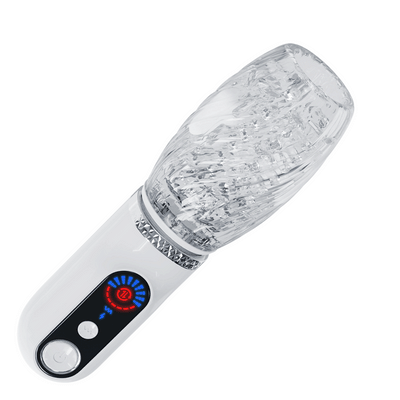Male masturbation: the benefits of autoeroticism
The belief that masturbation worsens eyesight or leads to blindness is a long-standing myth with historical roots dating back to ancient times, notably during the era of Aristotle. In historical perspectives, there was a misconception that the reproductive "seed" was thought to originate from the brain, particularly the region around the eyes. This misconception contributed to the unfounded notion that engaging in masturbation could have detrimental effects on eyesight, even leading to blindness.
Male masturbation and its effects
In the early 20th century, inquiries about the effects of male masturbation would often yield a list of alarming concerns from physicians. Beliefs at the time linked this natural act to a range of supposed health issues, including weakness, consumption, pimples, intellectual decline, memory loss, fits of rage, madness, epilepsy, fever, and even the extreme outcome of suicide.
Dating back to 1877, Dr. Kellogg described masturbation as "self-administered abuse," reinforcing the prevailing notion that engaging in this act could deplete the body and nerves. It was believed to drain essential energy and nutrients crucial for overall health, weaken semen, and, most significantly, hinder the possibility of successful procreation. This historical perspective sheds light on the evolving understanding of male sexuality and highlights the contrast between past misconceptions and contemporary knowledge.
Benefits of masturbation
In the wake of scientific advancements, the sexual revolution of the 1970s, and the erosion of societal taboos, the narrative around masturbation has undergone a significant shift. Contrary to historical misconceptions, not only is masturbation not considered harmful, but it is now acknowledged to offer a range of unexpected positive effects, which we detail below. This evolving perspective reflects a more nuanced understanding of sexual health and well-being.
Masturbation provides high-quality semen
Addressing concerns about fertility, masturbation plays a role in optimizing semen quality. Sperm, with a lifespan of 5-7 days, sees a constant renewal, with the production of approximately 3 million new sperm each day. Masturbation facilitates the removal of older sperm, ensuring that the ejaculated semen is comprised of the freshest and most robust sperm. This process contributes to maintaining optimal fertility by allowing the body to consistently produce high-quality semen, emphasizing the importance of being prepared for reproductive health.

Masturbation prevents prostate cancer
Research indicates that regular masturbation in men may play a role in preventing prostate cancer. Studies suggest that ejaculating 7 to 21 times a month, depending on the research, may be associated with a lower risk of developing prostate cancer. This connection underscores the potential health benefits of sexual activity in maintaining prostate health, adding another dimension to the positive aspects of a natural and normal sexual practice.
Improvement of the immune system
Various studies suggest that ejaculation, through activities like masturbation, can contribute to strengthening the immune system. This enhancement is particularly noted in its potential effectiveness against tumors and viral infections. These findings highlight a potential positive correlation between sexual activity and immune system function, providing additional insights into the multifaceted health benefits associated with this natural aspect of human sexuality.
Masturbating has positive hormonal effects
In addition to its systemic effects, masturbation elicits immediate hormonal responses that contribute to a sense of well-being. The release of dopamine, oxytocin, and prolactin during orgasm is responsible for post-orgasmic satisfaction and a positive mood. The parasympathetic system induces a state of general relaxation, while the longer-term effect involves the generation of serotonin, enhancing mood and proactivity in the subsequent hours.
While similar hormonal responses can be achieved through sexual intercourse, masturbation offers unique benefits, especially for individuals engaging in regular sexual activity. It provides a distinct avenue for experiencing these positive hormonal effects, complementing the benefits that may be attained through sexual intercourse.
Masturbating does not reduce the desire to have sex
Contrary to a common misconception, masturbation does not diminish the desire for sexual activity. The hormone prolactin, responsible for "sexual satiety," is released 400% more after sexual intercourse compared to masturbation-induced orgasms. This highlights that engaging in masturbation does not diminish the appetite for sex. On the contrary, it contributes to maintaining a healthy and satisfying sexual interest. So, rest assured, masturbation poses no risk of dulling your sexual appetite; rather, it supports a fulfilling and varied sexual experience.
Benefits of masturbation that you didn't know
Masturbation stands as a crucial act in self-care, offering a range of benefits that extend beyond commonly known advantages. It serves as a means to release both sexual and mental tension without the stress of performance anxiety often associated with relationships. Additionally, it provides an opportunity to enhance awareness and "train" for pleasure and performance. Improving one's masturbatory technique has been linked to enhancements in erection quality and synchronization.
Beyond the realm of sexual health, masturbation emerges as a holistic practice that can positively impact overall well-being. It serves as a tool to combat bad mood, promote better sleep, and even exhibits analgesic effects, offering relief from certain types of pain such as back pain. This multifaceted perspective emphasizes the diverse and often underestimated contributions of masturbation to both physical and mental health.










Leave a comment